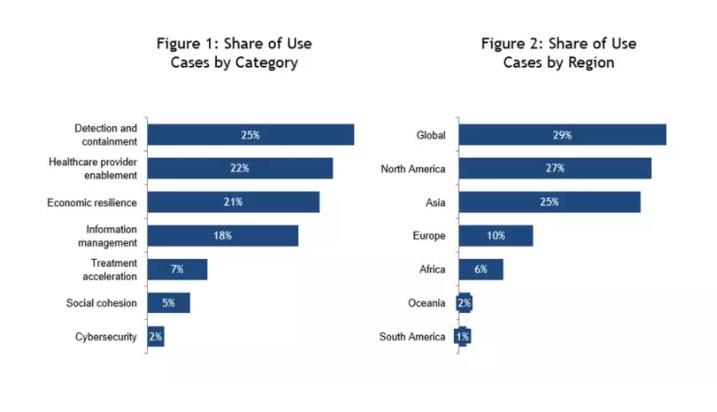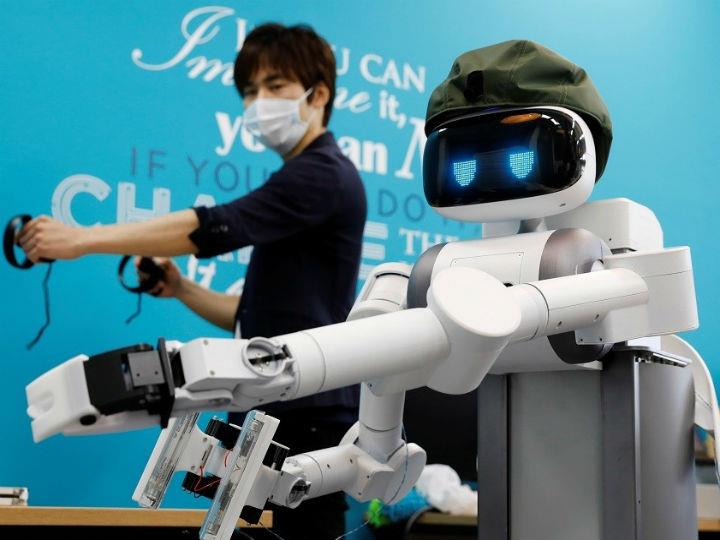by Brandon Magsamen and Grigory Shutko*
As companies seek new tech solutions to fight the COVID crisis, some interesting themes have emerged. New tech has fallen into certain categories, according to a Boston Consulting Group analysis, with 25% of solutions taking on detection and containment, 20% tackling problems involving healthcare provider enablement, and another 21% grappling with economic resilience. Additionally, nearly a third of these use cases were global, speaking to the collaborative and interconnective nature of this pandemic response.
Importantly, some of the most exciting solutions this research unearthed found new and surprising new purposes for existing technologies. As the world soberly approaches the virus’ ninth month, highlighting these innovative use cases can be a reminder of the resiliency and creativity the world continues to deploy to fight this global crisis.

1. Leveraging wearables in early COVID-19 detection
In mid-March, with widespread shelter-in-place orders implemented, wearables saw an enormous decline in global physical activity. Weekly step counts in Spain were down by 38%, Italy 25%, and New York and San Francisco nearly 20%. But while users weren’t tracking their steps, wearables still had an important role to play in battling the pandemic.
For instance, in care homes, wristbands from startup CarePredict helped track who had been near whom at a facility, sidestepping painstaking contact tracing efforts.
Scripps Research pivoted its research to leverage wearables for early COVID detection. Its research worked to “crowdsource” heart rate data, a metric that its researchers say have a high correlation to flu outbreaks, hoping to confirm early warning signs for individuals and public health officials.
Fitbit also found new uses for its technology to battle COVID. The wearables maker partnered with the Stanford Healthcare Innovation Lab to explore whether data points collected from its devices could help researchers detect COVID-19 even before symptoms emerge.
Fitbit collects nearly 250,000 data points per day, including a user’s heart rate, sleep patterns, and skin temperatures. The research aimed to train algorithms to pick up abnormal patterns deviating from a user’s baseline to predict and detect possible infections. So far, early findings of this study show that activity trackers can pick up on subtle changes in things like heart rate and breathing before full-fledged COVID-19 symptoms emerge. While the study has yet to be peer reviewed, the efforts show the capability for wearables to help tackle asymptomatic cases or even identify infections where testing is limited.
2. Telcos to spread public health messages
With the world’s second largest population, India knew it would need to get creative to tackle the virus. In early March, when the country had less than 50 confirmed cases, its Department of Telecom asked Telco operators to play coronavirus awareness messages and prevention techniques as a caller tune instead of the normal ringtone.
As people made calls, they heard a 30-second message on how to stop the virus’ spread as well as healthcare center contact information. This simple solution helped leverage cheap technology to reach the millions with a phone in their pocket, including the country’s 26% illiterate population.
3. Leveraging AI to help identify COVID treatments
While the world eagerly awaits a vaccine, European biotechnology company Nuritas is using AI to revolutionize the discovery of therapeutic antiviral peptides (short amino acids / small proteins). While peptide treatment has been around for nearly a century (Insulin, a peptide effective for controlling diabetes, was discovered in 1921), Nurita’s use of AI/ML to identify key peptides for testing has greatly shortened the research timeline, increased efficacy, and reduced the risk of drug development.
The revolutionary technology expects to be able to identify effective peptides within 4-5 months, and so far, 60% of the algorithm-identified peptides have had the desired activity against the target molecules. In addition to combating the viral particles, Nuritas is searching for peptides to reduce the body’s own cytokine-based inflammatory response, which is known to cause respiratory damage to COVID-19 patients.
4. Potential COVID detection through X-ray scans
As testing kits ran out and healthcare systems burst at the seams across Europe and the United States in March and April 2020, a team of international doctors developed software to detect COVID in patients through chest scans.
The technology leverages an AI-based database of X-ray scans and deep neural networks and is trained to distinguish the chest congestion differences between patients with pneumonia, tuberculosis and COVID-19. According to the researchers, the software can analyze the nature of fluid buildup in the lungs and attribute it to COVID with up to a 98% classification accuracy.
While not yet validated by international health organizations, a solution like this could prove essential with the ubiquity of X-ray technology combined with the shortages and inaccuracies of testing kits.
5. From e-commerce to “V-Commerce”
E-commerce took on new importance during the pandemic as shoppers stayed home to fight the virus’ spread. The moment created a unique opportunity to merge virtual reality technology with online shopping to recreate the brick-and-mortar browsing experience. US-based Lifestyles in 360 partnered with Whole Foods to take grocery shopping online for certain parts of the country. In this emerging “V-Commerce” solution, Whole Foods online stores had robust functionality including dynamic pricing and product selection, making online shopping more appealing for those more comfortable with the in-person experience.
While this use case may feel less profound than using AI to discover cures, social cohesion is a crucial part of the response. Social distance fatigue can drive people out of their homes too early, reversing progress made during stay-at-home orders. Solutions which help society feel connected despite physical distance can help keep people comfortable at home for longer periods of time.
As with every great challenge in human history, this pandemic has and will continue to bring out the best in human ingenuity and innovation. Among each of these exciting new technologies emerges one common theme: efficacy may not be measurable net, but casting a wide net is more likely to be effective at discovering useful technical applications.
We should continue to think creatively for economic, medical, and social applications of technology as they can be applied today and in the future. Such thinking won’t just help the ongoing efforts against COVID-19 but could help tackle future crises.
*Principal , The Boston Consulting Group and Platform Curator, Information Technology Industry, World Economic Forum
**first published in: www.weforum.org




 By: N. Peter Kramer
By: N. Peter Kramer
